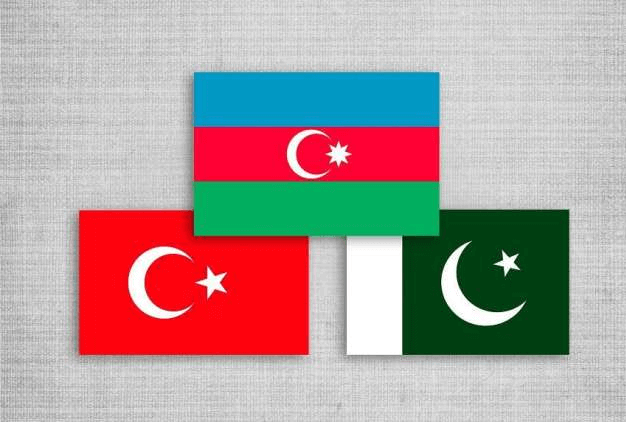Growing Distrust: India's Distance From Pakistan, Turkey, And Azerbaijan

Table of Contents
Deteriorating India-Pakistan Relations: A History of Conflict and Mistrust
The relationship between India and Pakistan has been defined by conflict and mistrust since their inception. Numerous factors contribute to this strained relationship, hindering regional stability and cooperation.
Kashmir Dispute: The Unresolved Core Issue
The ongoing Kashmir dispute remains the central point of contention, fueling hostility and hindering any meaningful progress in bilateral relations. This territorial conflict has led to multiple wars and continues to be a source of intense diplomatic friction.
- Cross-border terrorism: Pakistan-based militant groups have long been accused of carrying out attacks within India, exacerbating tensions and fueling cycles of violence.
- Military standoffs: Frequent military standoffs along the Line of Control (LoC) in Kashmir maintain a state of heightened alert and increase the risk of escalation.
- Diplomatic tensions: Regular diplomatic spats and the suspension of dialogue further undermine the possibility of peaceful resolution.
- Human rights concerns: Allegations of human rights violations in Kashmir from both sides further complicate the issue and hinder progress towards a solution.
Economic and Trade Barriers
Limited economic engagement and persistent trade restrictions further exacerbate the strained India-Pakistan relationship. The lack of substantial economic interaction reinforces mutual suspicion and prevents the development of shared interests.
- Lack of bilateral trade agreements: The absence of comprehensive trade agreements restricts the flow of goods and services between the two nations.
- Visa restrictions: Strict visa policies limit people-to-people contact, hindering cultural exchange and mutual understanding.
- Limited people-to-people contact: The restricted movement of people between India and Pakistan prevents the building of bridges and strengthens existing prejudices.
Regional Power Dynamics
Competing regional ambitions and support for opposing factions in Afghanistan and other regional conflicts fuel distrust between India and Pakistan. Both nations seek regional influence, leading to proxy conflicts and heightened competition.
- Different geopolitical alignments: India and Pakistan often align with different global and regional powers, leading to conflicting geopolitical interests.
- Support for insurgent groups: Accusations of supporting insurgent groups in each other's territory further fuel the cycle of mistrust.
- Conflicting narratives about regional stability: Differing perspectives on regional security issues hinder cooperation and increase the potential for misunderstanding.
Strained India-Turkey Relations: Ideological Differences and Geopolitical Shifts
While historically there were periods of cordiality, India-Turkey relations have become increasingly strained in recent years due to a confluence of factors.
Diverging Foreign Policy Approaches
India and Turkey's foreign policy goals often clash, particularly regarding regional conflicts and global alliances. This divergence in strategic priorities creates friction and limits cooperation.
- Differing stances on Syria: India and Turkey hold differing perspectives on the Syrian conflict, influencing their respective alliances and regional strategies.
- Palestine: The two nations have differing approaches to the Israeli-Palestinian conflict, leading to contrasting positions in international forums.
- The Kashmir issue: Turkey's vocal support for Pakistan's position on Kashmir further strains relations with India.
Turkey's Relations with Pakistan
Turkey's close ties with Pakistan, a long-standing rival of India, further complicates relations. This close relationship is perceived by India as a demonstration of support for its adversary.
- Military cooperation: Growing military cooperation between Turkey and Pakistan raises concerns in India about regional balance of power.
- Economic partnerships: Strengthening economic ties between Turkey and Pakistan create a perception of an anti-India bloc in the region.
- Strategic alliances: Strategic alliances formed between Turkey and Pakistan signal a deepening partnership that challenges India’s regional influence.
The Impact of Regional Alliances
The changing geopolitical landscape and the emergence of new alliances are significantly affecting India-Turkey ties. The rise of new power dynamics reshapes regional alliances and priorities.
- Shifting geopolitical alliances: The evolving global order and the shifting alliances of major powers impact bilateral relationships.
- Increasing influence of other world powers: The growing influence of other major global players adds another layer of complexity to India-Turkey relations.
- Competing economic interests: Competing economic interests in the region and beyond further complicate the already strained relationship.
The Complex Case of India-Azerbaijan Relations: Balancing Regional Interests
India's relationship with Azerbaijan presents a more nuanced picture, balancing strategic interests with the complexities of regional geopolitics.
Energy Security and Geopolitical Importance
Azerbaijan's strategic location and energy resources present both opportunities and challenges for India. Access to Caspian energy resources is a significant driver of engagement, but regional dynamics introduce complexities.
- Energy partnerships: India seeks to diversify its energy sources and Azerbaijan represents a crucial partner in this strategy.
- Transportation corridors: Azerbaijan is a key player in developing regional transportation corridors, offering India access to Central Asia and beyond.
- Regional connectivity initiatives: India actively participates in initiatives aiming to improve regional connectivity, including those involving Azerbaijan.
The Influence of Russia and Iran
The presence of major regional powers like Russia and Iran complicates India's engagement with Azerbaijan. Navigating these complex relationships requires careful diplomatic maneuvering.
- Regional security concerns: Concerns about regional security and stability influence India's approach to its relationship with Azerbaijan.
- The impact of sanctions: International sanctions and geopolitical tensions involving Russia and Iran impact India’s engagement with Azerbaijan.
- The balancing act for India's foreign policy: India must carefully balance its interests with Azerbaijan while managing relations with Russia and Iran.
Limited Scope of Cooperation
Despite potential areas of cooperation, the relationship remains relatively limited compared to other regional partners. Expanding cooperation requires addressing existing limitations.
- Trade volumes: Trade volumes between India and Azerbaijan remain relatively modest.
- Investment levels: Investment flows between the two countries are not as significant as they could be.
- The lack of comprehensive bilateral agreements: The absence of comprehensive bilateral agreements hinders deeper cooperation.
Conclusion
The growing distrust between India and its neighbors, including Pakistan, Turkey, and Azerbaijan, is a complex issue with deep-rooted historical, political, and economic causes. While there are pockets of potential cooperation, unresolved conflicts and diverging geopolitical interests continue to dominate the narrative. Addressing these challenges requires sustained diplomatic efforts, a commitment to peaceful conflict resolution, and a willingness to prioritize regional stability over short-term gains. Understanding the intricacies of these relationships—specifically, India-Pakistan relations, India-Turkey relations, and India-Azerbaijan relations—is crucial for navigating the evolving geopolitical landscape of South Asia. Further research into these dynamics is essential for fostering better understanding and promoting constructive dialogue in the region. Improving India-Pakistan relations, India-Turkey relations, and India-Azerbaijan relations requires a concerted effort towards de-escalation and cooperative diplomacy.

Featured Posts
-
 Police Investigate Fatal Shooting In Brooklyn Bridge Park
May 18, 2025
Police Investigate Fatal Shooting In Brooklyn Bridge Park
May 18, 2025 -
 Ezra Furman Billy Nomates And Damiano David This Weeks Top Albums
May 18, 2025
Ezra Furman Billy Nomates And Damiano David This Weeks Top Albums
May 18, 2025 -
 Ufc Vegas 106 Burns Vs Morales Complete Guide To Fight Card Date Time And Location
May 18, 2025
Ufc Vegas 106 Burns Vs Morales Complete Guide To Fight Card Date Time And Location
May 18, 2025 -
 Dodgers Conforto Stays Hot Powers Win Against Mariners
May 18, 2025
Dodgers Conforto Stays Hot Powers Win Against Mariners
May 18, 2025 -
 Safe And Secure Bitcoin And Crypto Casinos In 2025
May 18, 2025
Safe And Secure Bitcoin And Crypto Casinos In 2025
May 18, 2025
